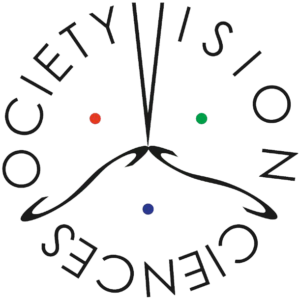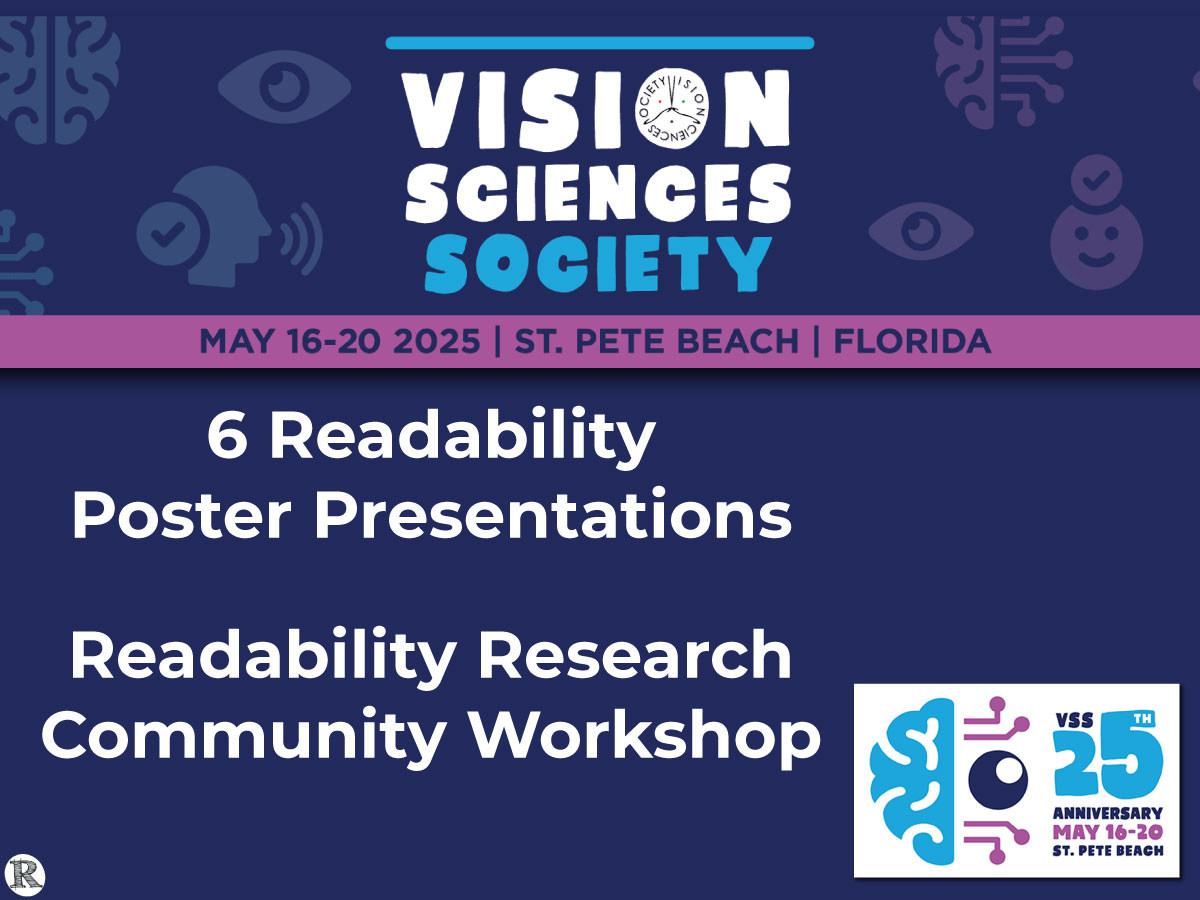VSS 2025
May 16-20 | St. Pete Beach, Florida
The Annual Meeting of the Vision Sciences Society encompasses the broad field of vision science, drawing on a range of disciplines, including visual psychophysics, visual neuroscience, computational vision, and visual cognition. The central goal is to understand how vision works and is used.
This year, the conference includes poster presentations on readability research from an impressive line-up of cross-disciplinary researchers. For the second time, a community workshop provides an opportunity for researchers to gather and share insights in a working session.
Join the team in St. Pete Beach for a week of readability and vision science discussions.
Poster Presentations
Crowding predicts reading speed and comfort across fonts and participants
Maria Pombo, Minjung Kim, Denis G. Pelli
Font Size, X-Height, and Readability: How Typography Affects Reading Speed Across Different Sizes
Ben Sawyer, Md Manumur Rashid, Hilary Palmén, Mert Küçük, Nilsu Atilgen
Psychophysics of variable fonts: Do multiple font features interact to impact readability?
Silvia Guidi, Anna Kosovicheva, Benjamin Wolfe
The impact of font on typo detection: a novel visual search paradigm
Emily Heffernan, Benjamin Wolfe, Anna Kosovicheva
The Impact of Font Weight on Expressiveness Beyond Latin: Insights from Arabic and English
Nilsu Atilgan, Hilary Palmén, Mert Küçük, Ben D. Sawyer
Typography and Pupilometry: Exploring the Speed, Comprehension, and Concentration Trade-Off in Reading
Borano Llana, Alisa Baron, Kushas Khadka, Yusra Suhail, Shaun Wallace
Readability Workshop 2: Inclusive Metrics and Design
Readability Research Community Workshop
Monday, May 19, 2024, 2:30 – 5:30 PM
The Readability Consortium is hosting the upcoming Readability Workshop 2: Inclusive Metrics and Design. Building on the success of last year’s workshop (article) with standing-room-only attendance, this year’s workshop will discuss the emerging field of digital readability, its opportunities, and challenges. This event will foster deeper interdisciplinary collaborations and advance the collective understanding of key issues in the field. The team will focus on two critical themes that emerged from last year’s discussions:
1) Metrics
Defining Realistic Goals: Expanding beyond traditional metrics such as reading speed, we can focus on measures like practical accuracy and usability in diverse applications, ensuring readability meets its functional demands.
Advancing Experimental Tools: Equally critical is the development of advanced psychophysical and behavioral tools to quantify readability. Leveraging the expertise of the vision science community, the group will identify gaps and develop robust experimental paradigms.
2) Inclusivity
Adaptive and Individualized Text Design for Low Vision and Diverse Groups: Instead of a one-size-fits-all approach, the focus will be on flexible, adaptable designs that consider individual preferences and needs. Tailored text solutions can address the unique challenges faced by diverse reading populations, ensuring greater accessibility and comfort.
Underrepresented Languages: The group will discuss research and design efforts for widely spoken but digitally underrepresented languages.
Organizers
Nilsu Atilgan, PhD, The Readability Consortium
Shaun Wallace, PhD, University of Rhode Island
Ben D. Sawyer, PhD, University of Central Florida
Moderator
Dr. Ben Wolfe, University of Toronto Mississauga, Canada
Additional Speakers
Sofie Beier, PhD, Royal Danish Academy, Denmark
Saeideh Ghahghaei Nezamabadi, PhD, Meta Reality Labs
Minjung Kim, PhD, Meta Reality Labs
Hilary Palmén, PhD, Google LLC
Denis Pelli. PhD, New York University
Dr. Ben Wolfe, University of Toronto Mississauga, Canada
Yingzi Xiong, PhD Johns Hopkins University
 About the Vision Sciences Society: The Vision Sciences Society
About the Vision Sciences Society: The Vision Sciences Society
The Vision Sciences Society is a nonprofit membership organization of scientists who are interested in the functional aspects of vision. VSS was founded in 2001 with the main purpose of holding an annual meeting that brings together scientists from across the globe, working in a broad range of disciplines that contribute to vision science, including visual psychophysics, neuroscience, computational vision and cognitive psychology. The scientific content of the meetings reflects the breadth of topics in modern vision science, from visual coding to perception, recognition to the visual control of action, as well as the recent development of new methodologies in cognitive psychology, computer vision, computational modeling, neurophysiology and neuroimaging. We also believe that the practice and progress of science are best accomplished when people with different viewpoints and backgrounds all contribute. In this manner, we recognize the value of our professional society in creating community and professional identity in ways that go beyond what can be achieved in our home institutions.
Mission
The Vision Sciences Society is committed to progress in understanding vision, and its relation to cognition, action and the brain. We promote progress in the field by encouraging and facilitating the exchange of knowledge among vision scientists. We work toward this goal by hosting a yearly meeting, where both new and established investigators from a broad range of disciplines and scientific perspectives can present and discuss their work in a relaxed, informal setting. Although VSS has grown to encompass a large, international community, we realize that barriers to participation still exist, and that they are not always recognized by those who do not experience them directly. To the best of our ability, we endeavor to break down any such barriers to entry into, and participation within the vision science community.
Scope
The Annual Meeting of the Vision Sciences Society has a broad scope within the field of vision science, drawing on disciplines that include – among others – visual psychophysics, physiology, neuroscience, computational modeling, theory and cognition. Our central goal is to understand how vision works and is used. The meeting showcases presentations that advance this goal, but also welcomes presentations that report on vision-relevant topics in allied fields.




